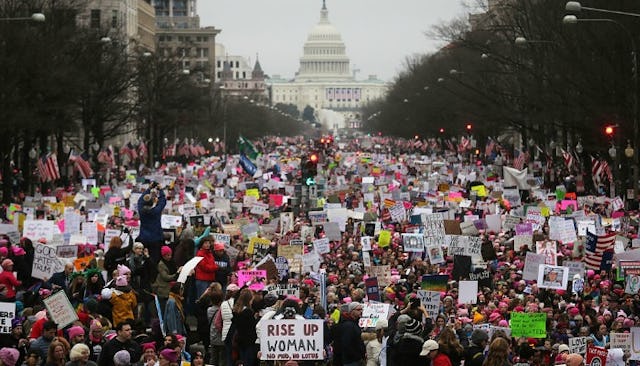This Is Why We March, And Why We Will Keep Marching

You may have noticed a few million people woke up early a few Saturdays ago and all donned some strange-looking pink hats. These millions of people then grabbed their homemade signs and maybe huddled together on some cars or buses or trains for a while. They clutched coffee mugs or pulled out breakfast sandwiches wrapped in tinfoil to share. There were a lot of women, so of course, someone passed around a tray of cupcakes.
The people got off the bus and then merged into a crowd of thousands of other people all going in the same direction. Their hearts swelled, and they got a little choked up when they saw the wave of bodies walking down the street. They held up their signs. They chanted things like, “This is what democracy looks like!” They high-fived the police. They cheered for passing motorists who shouted, “Rock on!” They hugged friends and strangers. They were peaceful. They didn’t damage anything. They weren’t arrested.
But why did they march?
You may have decided to go online and ask these people, “Why do you protest? You’re totally fine. You have rights today, and you’ll have rights tomorrow. Sit down. Be quiet. Accept the new administration. Stop whining. Stop being such a snowflake.”
Well, a lot of us weren’t actually marching for ourselves or for our rights. For example, I’m a white, college-educated, heterosexual woman with access to health insurance and affordable birth control and living in the middle of the forest. I’m not marginalized. Believe it or not, I didn’t get out of bed at 5 o’clock on a cold January morning to march for all of the white, straight, middle-class, mountain-dwellers.
I got up to march for others. But guess what? One of the speakers in Denver asked the crowd for a moment of bravery. She then asked us to raise our hand if we’d ever been sexually assaulted or molested or touched in a way that we didn’t want. There was a heartbeat of silence and then every single female I saw raised their hand — every woman. We were all different colors, shapes, religions, and socioeconomic statuses. My friends and I stood there with two 11-year-old girls who stared around at all of those raised hands. What do you say to them in that moment? Those little girls staring at all of those raised hands?
Yes, as women in America, we have a lot of rights. But obviously we haven’t arrived there yet, or there wouldn’t have been so many people crawling out of their cozy beds on a Saturday morning to say nope. If you don’t understand, then well, I’m going to assume you are white, and straight, and have access to health care and affordable birth control. Maybe you aren’t looking beyond how all of this affects your own life. Maybe looking at the pictures of all those people gathered together peacefully and me saying these things makes you feel uncomfortable. If they do, it’s probably time for you to feel uncomfortable.
A lot of us in this country disagree with each other. That’s beautiful. That’s democracy. But the reason that I peacefully marched with millions of humans worldwide that Saturday is because something is not right. Normal political disagreements don’t spur millions of people into marching down the streets of their local cities with pink hats and homemade signs. It just doesn’t happen. If a normal person had been elected, whom I might not totally agree with politically, trust me, I would have slept in. But this isn’t normal.
I marched because I see that this is not normal.
I marched for the earth.
I marched for the marginalized.
I marched for the immigrants coming here today just exactly as my immigrant great-grandparents came here.
I marched so that I will always remember where I was and what I was doing that Saturday.
I marched so that my 5-year-old daughter never has to raise her hand in a sea of shaking hands.
There is something powerful happening, and I, for one, am not going to stop with a march.
This article was originally published on